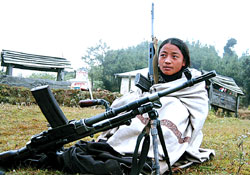|
|
The eight-point agreement has heightened optimism for peace as well as raised concern about what many have termed to be an ill thought-out appeasement plan.
The main concern is that the sudden dissolution of the hard-fought and newly restored parliament and the incorporation of the Maoists into the interim government is happening without any resolution to the issue of Maoist arms. But then, other politicians have gone as far as to term it a peaceful transfer of power to the Maoists.
Granted, a perfectly drawn out plan is not a guarantor of peace, as the renewed fighting in Sri Lanka and East Timor have shown. Similarly, keeping a loophole in the agreement can also spell disaster as in the case of Angola, where the rebels with their arms intact renewed fighting after losing in elections and plunged the country back into civil war.
That said, much can happen, behind the scenes between Prachanda and Koirala. Some claim there is a sincere verbal commitment from Pushpa Kamal Dahal to the seven party leadership about disarmament and multiparty competitive parliamentary system. Thus the ambiguity in the 8-point agreement has been defended as being necessary.
The idea of a privately conducted privileged conversation is a necessary element in a negotiation, and any such exchanges between Dahal and Koirala are perfectly understandable. But an excessive reliance on ambiguity can also backfire. Too much of an open space for the Maoists can strengthen their hand in carrying out Dahal's "October Revolution".
The more we engage the Maoists the harder it is for them to pull out. This is both a good thing, and wishful thinking. But, if the negotiation fails amid such high expectations and fanfare, it would be easier for Dahal to once more mobilise his troops and carry out his October Revolution. The likelihood of such a revolution will be high, especially if he is allowed to continue with his current high-octane proletariat rhetoric sometimes laden with gratuitous remarks. Should he not be forced to break the bad news to his troops starting right about now?
At some point, we need to put some onus on Dahal & Co to deliver too. To convince his cadres to abide by some of our expectations should be 'his problem'. Any supposed private guarantee (hint, hint, wink, wink) to some of our leaders and civil society members should not be taken as proof of a Maoist commitment. What matters is public accountability both in words and deeds.
At least, we should allow an open debate and public expression from all sides, and those who participate should not be branded "conspirators" (Dahal's language), nor should they be called naysayers. In a democracy, public debate and criticism are essential to generate pressure to form better public policy.
This may not be too obvious to someone like Dahal who has been underground for so long. Similarly, forcing five -ear militia training on Nepali people can't come through fiat. Policies like this and others such as our international trade and treaties, economic policies, and the rule of law must be debated and deliberated in public and voted by an elected parliament.
Local Maoists must also learn that in free society, people have a right to property. Recent coverage of a militia handing over keys of a house to its rightful owner is as blatant as honouring a husband for not beating his wife.
Decompression of the Maoist cadres to face such realities in a new Nepal should begin in earnest. This is now Dahal's responsibility. Civil society and the media have so far been very patient with the Maoist leadership and given them an unprecedented platform to articulate their position. The post-summit press conference at Baluwatar impressed some of our own civil society members so much they even declared him to be a visionary and dynamic leader comparable to B P Koirala. Well, let history judge that.
For now, disarmament before the elections is the single most vital issue. Creating a government with two armies will be a colossal mistake.
Alok K Bohara, Ph D, is professor of economics at the University of New Mexico, USA.




